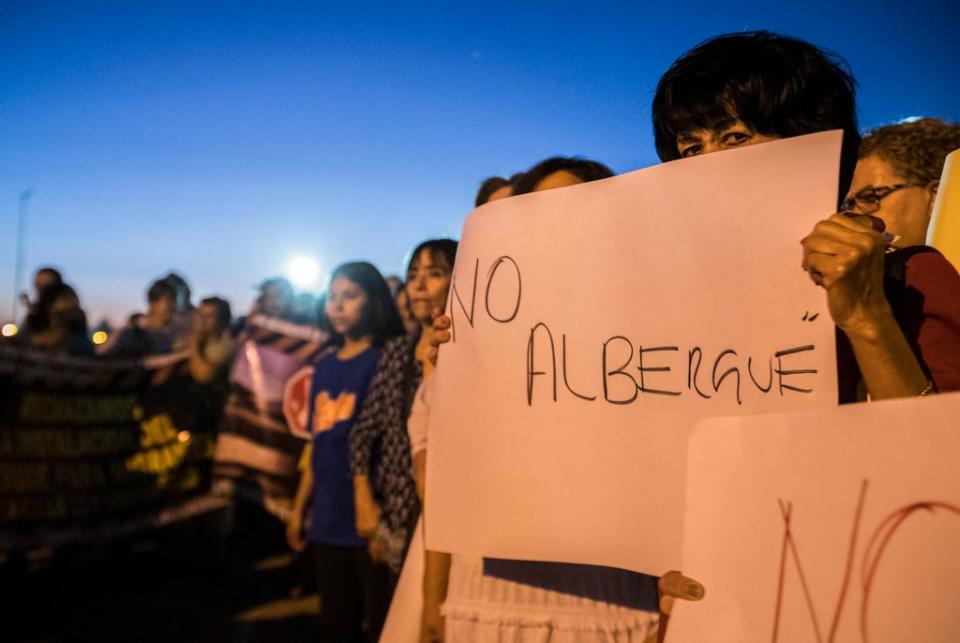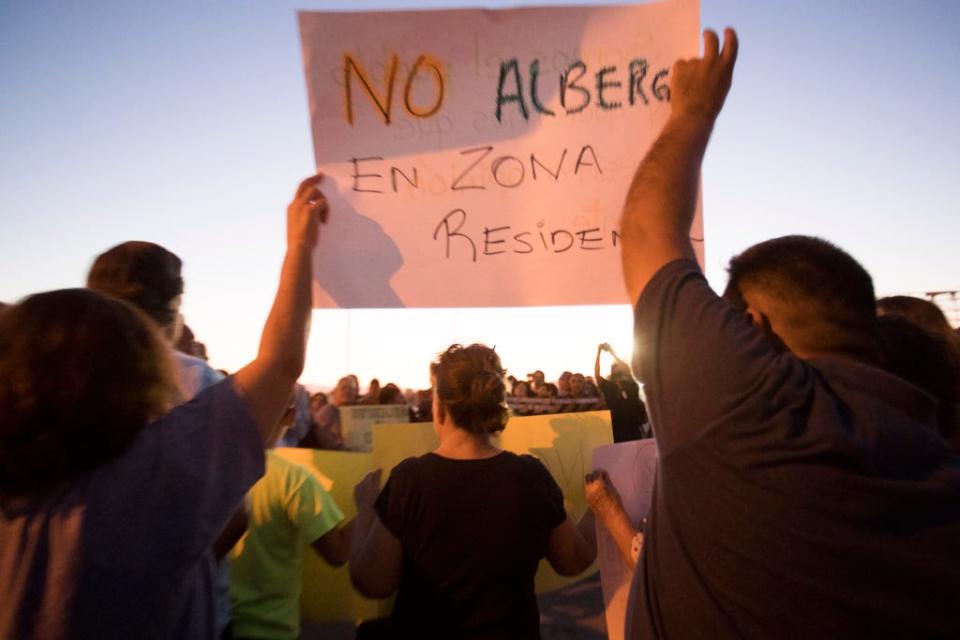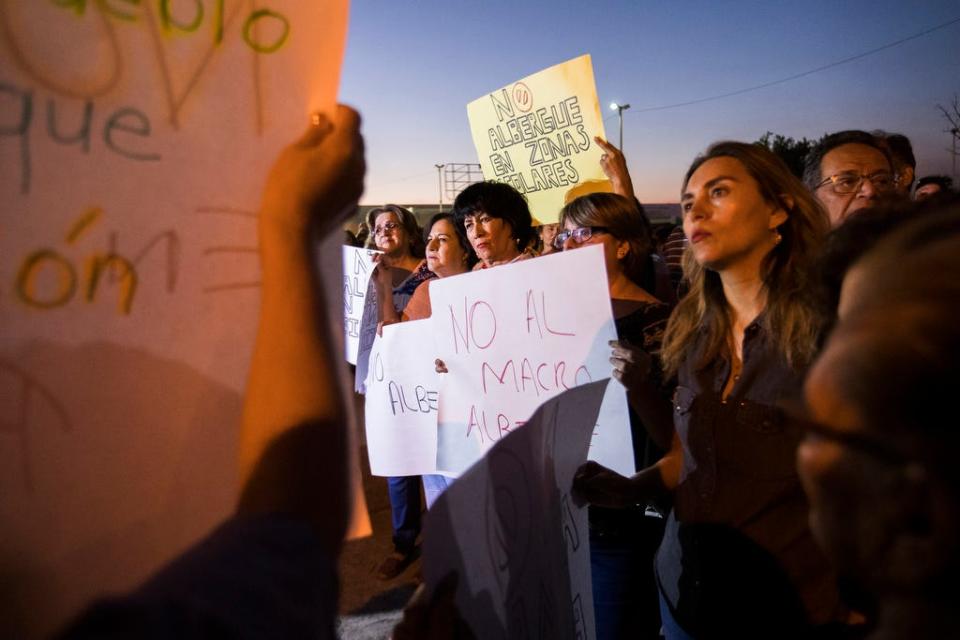Mexicali residents protest shelter for asylum seekers returned to Mexico under US policy

MEXICALI, Mexico – Residents gathered here Monday night to protest the Mexican federal government's plan to convert a shuttered grocery store into a shelter for asylum seekers who have been sent by United States officials to Mexico to await the resolution of their immigration cases.
Mexicali residents said they aren't racist, xenophobic or anti-immigrant. Rather, they said, they oppose the shelter because it could draw crime to the neighborhood, threaten the safety of area school children and drawdown home prices.
As the sun set over the former Soriana grocery store, nearly 200 residents and children waved yellow signs declaring their opposition to the placement of the shelter in an area near schools, businesses and homes. "No to the shelter," they chanted. "We don't want it!"
One deadly weekreveals where the immigration crisis begins — and where it ends
'Catch and release' ends: Trump administration announces the end of 'catch and release'; changes take effect soon
In response to the opposition, Abraham Salcido, a spokesman for the Mexican federal government in Baja California, said the northern state has always been "a land of migrants." He said opponents' concerns that the asylum seekers are bringing disease and insecurity to the border city are "not true."

The protest comes as the Mexican federal government moves forward with plans to open two shelters in the state of Baja California – one in Mexicali and another in Tijuana – for asylum-seeking families sent to Mexico to await their immigration hearings under the U.S. government’s so-called Migrant Protection Protocols.
Both shelters are expected to open in about two weeks, Salcido said. The government expects the shelters to initially house about 300 asylum seekers, but will have the capacity for several thousand people, he said.
A response to changes in US policy
The shelters are the Mexican government's response to a major change in the United States' asylum policy.
Until recently, asylum-seeking families could wait in the United States while their cases made their way through the backlogged immigration court system. But amid a recent wave of migration from Central America to the U.S.-Mexico border, U.S. immigration officials changed the rules.
The U.S. Department of Homeland Security announced in December it would return asylum seekers to Mexico. The department said the shift was necessary to deter migrants from making the trek north. Homeland Security implemented the policy in Tijuana in January and has gradually expanded it along the southwest border, as Border Patrol agents apprehended a record number of migrant families this spring.
Trump immigration change: would all but end asylum requests for Central American migrants
Asylum seekers: in US face years of waiting, little chance of winning their cases
The policy, unofficially known as Remain in Mexico, so far has survived legal challenges from the American Civil Liberties Union and others, who charged the Trump administration was forcibly returning vulnerable people to dangerous conditions in Mexican border cities.
Between Jan. 29 and July 11, U.S. immigration officials sent nearly 20,000 people to Mexico to await decisions on their cases, according to the Mexican government's National Institute of Migration. Officials released just over half those in the state of Baja California, with 6,649 people sent to Tijuana and 3,887 to Mexicali.

As a result, thousands of asylum-seeking families are now waiting in the border city across from Calexico, California, for the chance to make their cases before a U.S. immigration judge.
Throughout the spring and summer, the migrants crowded into privately operated shelters, where they slept on thin mats on the ground, surrounded by their backpacks and few belongings. They scrubbed their laundry by hand and hung it from all possible points. As temperatures soared into the triple digits, migrants sought shade at the shelters, waiting for months to attend their court dates in San Diego.
When the federal shelter opens this fall, it will feature sleeping quarters and dining areas, as well as sites where people can access medical care and obtain work permits, said Salcido, the government spokesman. He said the conditions at the shelter would be "respectful."
Concerns government will 'leave the problem for the community'
Karina Lopez Herrera, a mother of three who lives about five blocks from the former grocery store, said at the Monday night protest that the shelter should be located not in a residential area, but near the international border. Several migrant shelters are already there, she said, so people would have better access to lawyers and doctors.
Court ruling: Supreme Court allows Trump administration to restrict asylum seekers who have not sought refuge elsewhere
Remain in Mexico: New Trump administration policy requires asylum seekers to remain in Mexico, bans US entry
Herrera, who is a doctor, said she has visited the existing shelters to provide medical care, clothing and food. Many of the migrants there, she said, are hungry, sick and injured. She said she is worried that the conditions will be the same or worse at the government’s shelter.
“The more people there are, the more out of control the situation will be,” she said.
Sergio Dominguez, another area resident, said the former grocery store is not an adequate place to house asylum seekers and their children. He said the facility doesn’t have enough bathrooms for all the people who will be housed there.

He is concerned, he said, that the federal government, which is based in Mexico City, is going to open the shelter and then “leave the problem for the community.”
The Mexicali shelter has stirred up controversy since it was initially proposed. In early September, hundreds of people signed a petition expressing their opposition to the shelter. Residents at the protest vowed to continue fighting the shelter.
This summer, the Mexican government opened a massive shelter in Juarez, across the border from El Paso, Texas, to care for the thousands of asylum seekers returned there to await their immigration hearings.
The federal assistance came after the city and state governments, and the influential business community in Juarez, requested resources to manage the influx of migrants, the El Paso Times reported.
Follow Rebecca Plevin on Twitter: @rebeccaplevin
This article originally appeared on Palm Springs Desert Sun: Migrants: Shelter for US asylum seekers returned to Mexico protested

